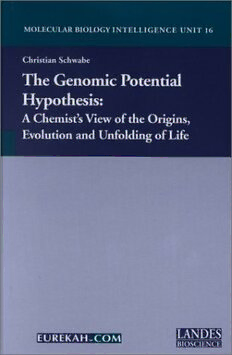
The Genomic Potential Hypothesis : A Chemist's View of the Origins, Evolution and Unfolding of Life PDF
123 Pages·2001·0.785 MB·English
Most books are stored in the elastic cloud where traffic is expensive. For this reason, we have a limit on daily download.
Preview The Genomic Potential Hypothesis : A Chemist's View of the Origins, Evolution and Unfolding of Life
Description:
The Genomic Potential Hypothesis is a biochemist's view of the origin, evolution, and development of life. The arguments given in this book question the old explanation in order to make room for new thoughts at the sight of the same evidence. It is widely accepted that there is no way to proof a hypothesis, but a current hypothesis can be disproved when science has driven development beyond the foundation of the old model. So it happens that the same data will be presented with a new interpretation and that too is not uncommon in a world that was mostly flat not too long ago. Evolution is the ripening of the embryonic quasi stem cells of each origin which began to transform, group by group, into the final phenotype in the Cambrian, the least complex ones being first to make their fossil imprint. Once established species do not branch or adapt beyond physiological limits. Stressed beyond these limits a species will suffer extinction. Mutations are not a mechanism to produce new organisms. Therefore there are no intermediate forms and the evolutionary trees are an image created by the sequential ripening of pro-forms and their rapid rise into the fossil scene.
See more
The list of books you might like
Most books are stored in the elastic cloud where traffic is expensive. For this reason, we have a limit on daily download.
